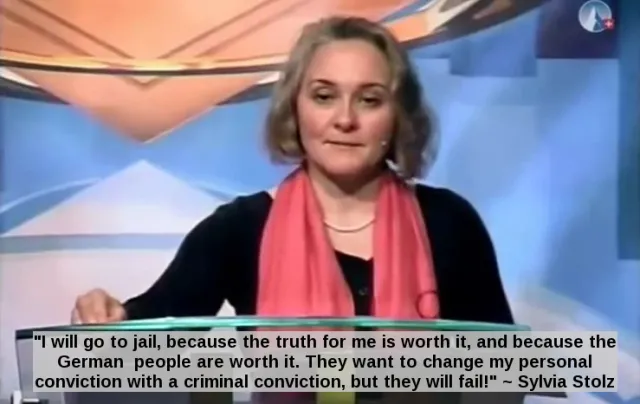SYLVIA STOLZ IS ONCE AGAIN BEING MARTYRED by the Federal Republic of Germany (FRG) for speaking about, and thereby exposing, the legal insanity that passes for law in dealing with the National Socialist period in history.
By Carolyn Yeager
Just yesterday, Chancellor Angela Merkel repeated to Christiane Amanpour in a CNN interview that Germany had to be vigilant in the face of nationalist and populist political movements currently rising because:
"In Germany, obviously, [such movements] always have to be seen in a certain context, in the context of our past, which means we have to be that much more vigilant than others."
She added: "[That's] why […] we always have to put ourselves in the other person's shoes, why we stand up against intolerance, why we show no tolerance toward violations of human rights." For this reason—Germany's past—the founders of the FRG incorporated the notorious Paragraph 130 into the German Basic Law (which substitutes for a Constitution by and for the people), to modify the promise of “freedom of expression” to all German citizens. Vigilance required it.
Sylvia Stolz, a fully qualified lawyer who is now not allowed to practice her profession, has once again been confined to a German prison for the next 18 months because she gave a speech at a Swiss Anti-Censorship forum in 2012, laying out her ideas on how Paragraph 130 in the Germany criminal code can be understood in legal terms.
After reviewing that speech, I am convinced that more people need to understand just how the Federal Republic of Germany can call itself the 'most free' Germany ever, with freedom of expression guaranteed for all, while at the same time fining and imprisoning its citizens for expressing their beliefs on a certain historical subject. Sylvia tells us that it's done by defining modern German history as so exceptional that it needs to be treated differently from all other nations of the world!
I've condensed and excerpted from Sylvia's one hour speech to bring you the following summary (I've added the underlining and bolding). In Sylvia's words:
First of all, it must be said, that the principle of the 'defined penal code' has not been fulfilled. It has been downright violated. This principle dictates that the accused must be allowed to know what he did wrong. And what he should have done otherwise. If someone takes a bicycle that does not belong to him then this of course constitutes 'theft', as we all know. In cases of libel, where a person says something negative, causing reputational damage, then the question of the court is, whether or not what was said is true or false. And if true, it does not constitute 'libel' because in theory one is allowed to speak the truth. In the case of 'holocaust denial' the first problem we are faced with is that the holocaust isn't defined anywhere. That is the problem of a 'defined penal code. ' An authoritative definition cannot be found anywhere.
In German Law it is paragraph 130 section 3, according to which so-called 'holocaust deniers' are fined or imprisoned up to 5 years for each singular offense. In this paragraph there is no mention of the holocaust itself. It is not defined in the law as such. Instead it refers to paragraph 6 section 1 of international law. And here we find a definition of 'genocide.' And whoever denies that such a 'genocide' has occurred, commits an offense, provided that additional criteria are met such as disturbance of the public order. But what I would like to emphasize is the definition of 'genocide' in paragraph 6. It is defined as 'genocide' when 'ONE member' of an ethnic, religious or other group is killed with the intention of causing 'the deliberate and systematic destruction, in whole or in part, of an ethnic, racial, religious or national group.'
In cases of 'holocaust denial', we are dealing with a criminal denial of murder and then, of course, we would expect to find the details of that murder spelled out too. Otherwise we have no idea what the accused actually denied. This is the problem, there is no clarity when it comes to what was denied specifically. There should be at least one case against a holocaust denier in which the specifics of the related crime have been demonstrated and specified. I know of no such verdict.
Now some people might say, 'What about the Nuremberg trial? It's probably in there somewhere, the details?' This is not the case. Let me read you the relevant passage of the Nuremberg verdict, where gas-chambers are mentioned. Here it says and I quote, 'A certain number of the concentration camps were equipped with gas chambers for the wholesale destruction of the inmates, and with furnaces for the burning of the bodies. Some of them were in fact used for the extermination of Jews as part of the ‘final solution’ of the Jewish problem. Most of the non-Jewish inmates were used for labor, although the conditions under which they worked made labor and death almost synonymous terms. Those inmates who became ill and were unable to work were either destroyed in the gas chambers or sent to special infirmaries, where they were given entirely inadequate medical treatment, worse food if possible than the working inmates, and left to die.' That is all it says about gas-chambers in the Nuremberg verdicts.
The London statutes were written specifically for this military tribunal. In Article 19 it says, 'The Tribunal shall not be bound by rules of evidence'. In Article 21: 'The Tribunal shall not require proof of facts of common knowledge, but shall take judicial notice thereof.' Interesting, right? It shall not require proof of facts of common knowledge, but what are 'facts of common knowledge?' It is usually the job of the courts to establish the facts, not presume the facts.
From the so-called 'Frankfurt Auschwitz Trials', it says in the final verdict, and I quote, 'The court lacked almost all the means of evidence of a normal murder trial and necessary for gaining a truthful image of the events at the time of the murder. There were no bodies of the victims, no autopsy reports, no expert reports on the cause and time of death, there was no evidence as to the criminals, the murder weapons, etc. Verification of the witness testimonies was only possible in rare cases.'
Additionally, there were barely any of the witnesses who could be described as neutral observers of the occurrences of the Auschwitz concentration camp. From this verdict we are forced to conclude ... that 'the court was in the clarification of the crimes of the accused almost solely dependent upon witness testimonies.' One never gets to know, either as defense attorney or as prosecutor, what actually has been established as fact.
When submitting evidence, one necessarily has to phrase it as statements of facts. Otherwise it will not constitute evidence, and will be dismissed. That means you have to claim as fact that which you want to demonstrate to the court or it is not valid and can be dismissed on formal grounds. But when submitting evidence on behalf of a holocaust denier, asking the court to establish that so-and-so is the case, by expert testimony or in accordance with earlier reports, the evidence is not admitted by the court, and the lawyer is then accused and sentenced for holocaust denial.
The reason given was that the court, in light of the available books and pictures, holds no doubt as to the 'obviousness' of the holocaust. I as well as my lawyer then requested that the court point out which books and which pictures gave them certainty with regard to the 'obviousness' of the holocaust. These requests were dismissed because 'the holocaust and the national-socialist violent crimes against the Jews were obvious'. So we did not receive an answer as to which material formed the basis for the certainty of the court. All we got was a very general reference to 'newspapers, radio and television, lexicons and history books'.
In the so-called Wunsiedel-decision of the Supreme Court of 2009, the court declared that Germany is by way of exception allowed to keep special statutes such as paragraph 130. That is the statute criminalising one particular kind of speech, with the inherent criminalisation of evidence and legal defense. Germany is by exception allowed to keep this special statute because of 'the unique historical identity of the Federal Republic of Germany shaped through contrast to national-socialism.' In other words, Germany is allowed to keep the exceptions to free speech, because it is the 'Federal Republic of Germany.'
The second justification is not stated as clearly and is found elsewhere in this supreme court decision. Here they speak of 'unique' crimes and seem to suggest that, because we are dealing with this 'unique' crime, then by way of exception demonstration of evidence is both superfluous and criminal. Giving evidence is both superfluous and criminal when dealing with a 'unique' crime. Does this seem logical to you?
These are the two pillars upon which the criminalisation of holocaust denial rests. It is the justification within legal-theory, so to speak. 'The unique historical identity of the Federal Republic of Germany' and the 'unique crime' itself, are the reasons given for not allowing the demonstration of evidence.
What are we allowed to say then? There is no answer. It is of course not stated in the transcripts, however the 'Berliner Tageszeitung' (Berlin Daily) the so-called 'TAZ' had the honor of reporting this statement by Judge Meinerzhagen. I now quote the Berlin daily newspaper 'TAZ' from 9th of February 2007 reporting on the trial against Ernst Zündel: 'Towards the end, and much to the surprise of the anti-fascist groupings present, the court dismissed all the submitted evidence for the short and simple reason that it is completely irrelevant whether the holocaust really did happen or did not happen. It is illegal to deny it in Germany and that is all that counts in court.'
(End of Sylvia's remarks)
This is the famous Truth is no Defense statement. In normal murder trials, truth that is proven through rules of evidence is a defense, or a conviction. In holocaust denial trials, this rule is stood on its head because of the unique historical identity of the FRG. Case closed.
We can and should ask: Who made the decision that Germany must be forever stigmatized with Holocaust guilt? Whom does it serve?
- 1115 views





